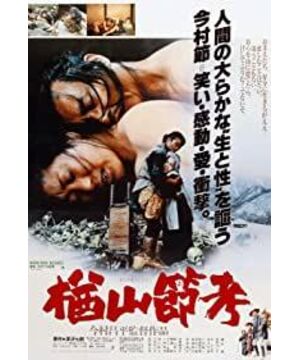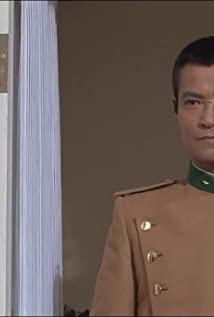"To be old and not to die is to be a thief."
-"The Analects of Confucius · Xian Wen"
In order to live, there will be various reasons; in order to live, there will be a struggle for existence, when two people are only left The next bowl of rice, whether you are willing to leave this bowl of rice to others, in such a cruel proposition, the statement is so pale, only the facts show your bottom line to the world.
Once upon a time, Old Man Bing Xin chanted these words. This is an old man's monologue, and it is also her perception of life, how to live in the true sense of life! To be alive, what kind of mental outlook should be alive.
This film, which has been changed based on Shichiro Fukasawa’s novel "Narayama Minor Test", tells that in the harsh living environment, human beings have to make choices for the reproduction of the population. In this situation, any honest accusation is so pale. Survival is the rule of nature, life and death, and things choose heaven. The proposition of "Narayama Festival Kao" is serious, it makes all the living have a sense and should be awakened. When the mother-in-law puts her hands together on the top of the mountain and sits waiting for her return, the person has been sublimated and she has entered the nature. , Becomes a kind of good cycle, becomes the organic part of the continuation, becomes the mother of the earth. People follow the earth, the earth follows the sky, the heaven follows the Tao, and the Tao follows nature. [Note 2] In
winter, a cold and stern winter, the barren mountains are covered with thick snow, and the branches of the green leaves are still stretched out to the sky, looking for the possibility of breathing and vitality.
There are some thatched cottages scattered in the small col. During the days when the mountain was covered by heavy snow, only the curling smoke showed signs of human smoke.
Survival is harsh, and its moral propositions are often post-positioned. For those who fight against nature and hope to exist, it is just a way of saying. Survival is a last word at this moment.
Frozen mountain villages are watching the bottom line of existence, live, and sometimes all claims are in vain. Shohei Imamura used several shots to illustrate the grim situation of their survival.
A mouse brings the memory of the first creature. The mouse is the best symbol of survival. It runs through the entire history of mankind. In his film, Masahira Imamura uses various animal images to metaphorize survival and reproduction. Survival is the way of heaven, and it is supreme in the laws of nature. Only those who fill their stomachs and satisfy their sexual desires will come up with and formulate all kinds of weird morals and laws. Before, everything was instinctive and natural.
In the simple farmhouse, the mother-in-law Arlene is the head of the family. She is 69 years old. According to the local custom, she will have her eldest son go back to the west in a year. The barrenness of the small village has forced them to formulate such harsh rules to abandon the elderly for the sake of their children and grandchildren. This seems cruel, and is for the accusations and criticisms of pseudo-Daoists. However, between humanity and heaven, people must admire nature and heaven and earth. In an unchangeable situation, it is only feasible to abandon the old and the weak for the sake of the lives of most people
.
In the spring, the severe winter is blowing, the fish is flying shallowly, and the birds are singing the joy of spring on the branches that have just burst into spring buds. Farmers started hunting in the mountains, so that their empty abdominal cavity had the food they were looking forward to.
Shohei Imamura used the lens of an eagle digging its prey to express the natural biological chain. It is the way of heaven, and it is the foundation for endless life. The moral issue of survival is the product of the development of material civilization to a certain extent. Here, it is in vain. !
The ice begins to melt. The little corpse of a baby makes us feel the moral proposition of life again. In a place where human resources can only make ourselves barely survive, the responsibility to others is compelled by the harsh natural environment. A place of poverty to give up and ignore. Let's let nature choose!
Any survival philosophy is the product of a certain historical period. The wishes and clan rules were all to protect the overall survival of the clan at the time, and there is nothing to blame.
Arlene’s mother-in-law’s husband angered the tribe because he did not want to send his mother to Narayama many years ago. Arlene's second son, Lisuke, is also demented, and Chenping, the eldest son, has become the backbone of the family.
Spring has sprouted all things on the earth, and it has also brought forth the hope of being sealed by the cold. Yellow-fronted snakes linger and copulate, and people express their suppressed passions on the earth. The birds are watching quietly, and the pairs of frogs are no longer noisy and silently watching the wild union of two naked bodies on the earth. . The days when the chaffinch returns, the snakes roam, and the spring returns to the earth are not always poetic.
In the partition of Tatsuhira's house, Azhong's family lived. Azhong's father was also 70 asleep. This winter, he was going to Narayama to wait for his return to the west. The stingy Azhong tied him in the house in order to prevent his elderly father from stealing food. Such a comparison with Chenping is a comparison of the bottom line of human nature in a difficult time, without language!
On Chenping’s resolute face, I saw the perseverance and perseverance of the Yamato nation. This was once the standard of the family and the country, but what we see now is blindly bowing, a nation that cannot stand upright in spirit and personality. Its future must be. It is also bleak. Let us revisit Emerson's 1837 lecture at Harvard's annual meeting of the "American University Fellowship Association":
"We depend on other people's lives. We are like a long apprenticeship of foreign study, which is about to end. We are surrounded by thousands. People who are living in Wan Chong cannot always be fed by the dried-up nucleus of foreign fruits!"
A nation that is immortal is not easy to be defeated, and this is the driving force behind Japan's prance after the war.
In the cherry blossom season, Chenping's filling house, Ayu, came uninvited, and she ate the food her mother-in-law gave her with a satisfied look. Don't describe all fate, the point of fate is actually the possibility of survival.
The second son, Lisuke, was poor and had no money to marry a wife. He suffered from spying and even had sex with a dog to vent his desires. He finally fulfilled his wish before his mother returned to the West. In this movie, sex has nothing to do with love. He is just instinctive, naked and primitive animal state, just like the flow of nature, easy and orderly.
On the eve of her mother-in-law's return to the west, the eldest son Tatsuhei told her mother-in-law a secret on the way to the mountain. Shohei Imamura used surrealism to blur the boundaries between memories and magic. Tatsupei killed his father 15 years ago. Facing Chenping's narrative, the mother-in-law's open-mindedness is the understanding and transcendence of death. She said: It was not you who killed your father, but the mountain god who killed your father. Some have gone home, and some have been reborn as a result. From another perspective, death is not a kind of passing, a kind of eternal life.
The section of mother-in-law teaching daughter-in-law to catch fish is the inheritance of life. Teaching to daughter-in-law is for the continuation of life, and the carrier of continuation is the mother first. Here, Imamura Shohei tells us the philosophy of survival when we continue. Shows his reverence for the mother of life. The attitude and praise of women in Japanese movies is always higher than that of men, because in that long and narrow island country, in those miserable years, motherhood is the basic condition for continuation of offspring.
There is a sense of sacredness in the scene of the mother-in-law going up the mountain and returning to the west. The patriarchs warned Chenping’s rules of going up the mountain, worshiping mountain gods is a custom and ritual, and it is a kind of transcendence of the meaning of human existence in a large environment.
In the play, the scene where the mother-in-law knocked her teeth was emotional and distressing. For the continuation of the clan rules and clan, she had to go to death, and she voluntarily went to death. Such transcendence is not easy. This is an insight into life and death, this is a realm of seeing death through, throwing the skin into the sky, and handing over the soul to the mountain to wait for the containment of heaven. The mother-in-law had already put her life and death out of her tragic and majesty. In such helplessness, death became an obligation and a way to allow others to exist and to continue their lives.
On the long mountain road, Chenping silently carried his mother in accordance with the clan rules. The rugged and bumpy mountain roads test the faith of the people who enter the mountains to return to the gods. It took Shihei Imamura forty minutes to describe the road to the mountains. The mother-in-law's expression has long been peaceful and serene, besides life and death, going to death is also a kind of lofty.
When her mother was sitting on the top of the mountain, when the first winter snow was falling to the world, Granny Arlene’s hands were already divine, she converted to the god of nature, and she converted to the divine way. Complete the original natural posture in the path of reincarnation and become a part of the natural chain.
However, no one can comprehend this way. The father of A-Lin’s mother-in-law’s neighbor, Azhong, was unwilling to die and struggled all the way. In the end he pushed down the cliff for his rebellious son Azhong. He also went to death. Human beings are so different and there is no such tragic death. , That living magnificence. In fact, anyone will withdraw from the stage of history, conform to the laws of heaven, and complete the process and reincarnation from death to life and from life to death in your circumstances.
Similarly, in the rules of survival, both theft and the weak must be abandoned. So when the people collectively murdered (buried alive) the pine nuts family that stole food, they all so naturally deprived the family of eight lives.
It seems that this is cruel, but this kind of cruelty is a convention and a necessary criterion in the predicament of survival, so that more people can have a chance for life.
Lao Tzu said again: People are weak in life, and strong in death. The life of vegetation is also soft and fragile, and its death is also withered. Therefore, the strong are those who die, and the weak are those who live. [Note 3] The
snow covered the bones on the mountain road, and also covered the thoughts. The mother-in-law sat on the high mountain like a Shinto.
Chenping walked down the mountain, towards the unfinished life, snow, pure white; heart, peace.
In the brilliant year of Ruixue, farmers hide hope in the winter in the snow, and snow also holds the future of endless human beings. In the snowmelt season of the coming year, watch the spring sprout, wait for the first mouse to move out of the ground, and wait for the mountain flowers. The prosperous season brings new life.
Masahira Imamura used such a tragic look at the living conditions of human beings. Under the premise of survival, morals are sometimes so pale and weak. This is the reflection of the Yamato nation on its own situation. I also ask all Chinese compatriots to see clearly: survival Although his tragic thinking is the pre-action force of a nation, he also has a negative attitude towards existence. It even causes harm to others and other countries. The Japanese invaders used the slogan to eat rice in Kanto to confuse their farmers and act as cannon fodder.
Remember, every bloody Chinese must remember:
Japan’s right-wingers will die, my heart will not die, be wary! The Chinese of the Mean
On Tuesday, October 7, 2003, at
15:58. Independent film critic: OSAMA KAVKALU at Pudong Jackdaw’s In the afternoon
[Note 1] Narayama Festival examines the original work of Shichiro Fukasawa http://home.njenet.net. cn/yinghuaxia/works/jpnovel/qsxdk.xml
[Note 2] "Tao De Jing" 25 chapters
[Note 3] "Daode Jing" 76 chapters
[Note 4] "Narayama Festival Test" 1983 Cannes Film Festival won gold Palm Awards
View more about The Ballad of Narayama reviews











